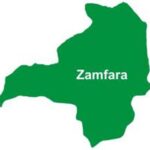“Where premises are misunderstood inferences must be unsound,” – James Bryce
In general, the methodology of social or political discourses in Nigeria must not be allowed to be driven or dictated by unsubstantiated premises. In like manner, the calls for the review of the constitution should be dictated by the viewpoints and interests of the generality of the Nigerian population. Proposals for the alteration of the Nigerian constitution have become a ritual in the Nigerian legislature. It has also become a favourite catch-phrase of the advocates of “restructuring” of Nigeria over the years, whose grouse with that instrument is that it is “unworkable” and hence formed an obstacle to the achievement of “true federalism” in the country.
In view of these tendencies and perceptions, it has become unavoidable to ask the question if indeed the 1999 Constitution of the Federal Republic of Nigeria is the bane of the country today? If so, what are its faults or deficiencies? What are the problems with its antecedents or origin? What are its philosophical inadequacies and social defects? Why is it a problem for the country? Does it not measure up to the expectations of present and future evolution of the country? Are other countries better than Nigeria mainly because their constitutions are integrally more sound than Nigeria’s?
Other questions that we should ask should include, can the efficacy or utility of a constitution be separated from the attitudinal and mental capacities of its operators? Do constitutions alone in their own solitary existence make nations great or better? Does whittling down the powers of the central government and their devolution to the local or state governments make the country better and the constitution more effective? Did the constitution impose a unitary order or system of government on our country?
I believe these are pertinent questions to which answers must be provided by those who have called for the abrogation of the 1999 constitution for reasons that are best known to them. All that we can do on our part is to express our thoughts on that normative instrument and lay them before the Nigerian public for its judgment. In doing so, it is our duty to warn the Nigerian public to be mindful of the premises of the agitators for the abrogation of the 1999 constitution so as to avoid falling into the trap of drawing hasty or misinformed inferences as advised so rightly by Viscount Bryce. Most importantly, it should be demonstrated factually if the 1999 constitution favours one region of the country more than the others in its current form, and therefore should be amended to become truly federal.
It is a matter of considerable disquiet that the 1999 constitution has not only been vilified for its antecedents and framing, but it has also been blamed in a blanket fashion for the many ills afflicting Nigeria today. Whether such sentiments and viewpoints are justified or not is not the matter of the moment. What really matters is whether at this time of political evolution of Nigeria, another constitution is needed at all. If that is so, a rational justification must be adduced and offered to the Nigerian public, not one based on sectional preferences or the advancement of certain regional interests, but one based on a holistic explanation that serves the interests of the larger Nigerian nation and people.
The design of any normative framework or instrument for Nigeria should first and foremost, take into account that a constitution is enacted in order to preserve peace, provide laws for the general conduct of the business of government, codify the rights and privileges of the citizens, and finally, improve the overall conditions of the country. Therefore, the spirit and system of constitutional liberty are the most valuable possessions of a free people. Where intrinsic defects are found or are thought to exist in the constitution that would warrant the alteration or abrogation of that instrument, as the case may be, certain fundamental principles must be observed in the process in order to maintain its integrity and general tenor.
One such consideration in any contemplated alteration of the Nigerian constitution should be that the constitution should make it a priority to establish the desired or appropriate forms of government for the country. In doing so, it is imperative that the constitution should provide clear distinctions of various offices of state, the establishment of civil and criminal jurisdictions, the rights and privileges of citizens and the economic system that the country should adopt. Along these lines, a normative concept of responsibilities, duties, privileges and an accountable system of government will have to be entrenched in any new framework for the purposes of continuity of government and entrenchment of the fundamental tenets of participatory democracy in our country.
A cocktail of issues ranging from the sublime to the bewildering have been advanced as forming the rationale for “restructuring” of Nigeria in order to make the country “better governed” and more “progressive” in outlook and content. This belief seems to be widespread in some quarters and has necessitated a visit by a group of eminent Nigerians some time ago to President Bola Ahmed Tinubu, to place before him a request to send a bill to the National Assembly that would initiate the formulation of a new constitution for Nigeria. This is against the backdrop of the fact that as far back as the 6th National Assembly, if I remember correctly, members have embarked on successive exercises to alter the constitution in accordance with the demands of rendering it a “workable” document that would be in tune with the temper of the times in the country.
During the 9th National Assembly also, 35 proposals for the alteration of the 1999 constitution were submitted to the president for his approval. The procedures for amendment of the constitution as specified in Section 9 were duly observed, and the proposals were submitted to the State Houses of Assembly for vetting and approval. The process was intended to achieve the devolution of more powers to the states and the creation of “true fiscal federalism” in the country, according to the then Deputy Speaker of the House of Representatives and Chairman of the House Committee on Constitution Review, Idris Wase.
A previous effort at altering the constitution also took place in 2018 during the administration of the late President Umaru Musa Yar’Adua, when five alterations were adopted in the constitution. Attempts to amend the constitution during President Olusegun Obasanjo and President Goodluck Ebele Jonathan, did not materialise for reasons of lack of convergence of views between the Presidency and the National Assembly on the substantive aspects of the proposed changes as well as the political objectives that were intended to be achieved through such exercises at those times.
During the administration of President Muhammadu Buhari, several amendments were made in the constitution most of which dealt with basic procedural matters and rectification of perceived anomalies in certain institutional frameworks. They were important in the sense that they conveyed the idea of flexibility of the constitution and the workability of the processes of amending that legal instrument. It also buttressed the smooth functioning of the principle of separation of powers in our democratic system between the legislative and executive arms of government in our country.
The current 10th National Assembly not to be outdone by its predecessors, also instituted a process of altering the 1999 constitution. In March 2024 for instance, a general call circular was issued requesting proposals from Nigerians about some changes to be made in the document. Sixteen thematic areas were listed for amendment while various other ideas were being contemplated towards remaking the constitution. Most of the discussions on the alteration of the constitution centred around reactive issues of special interests driven by vociferous agitation for restructuring the country.
In this regard, successive National Assemblies were forced to embark on the review exercise focusing mainly on the themes of devolution of powers and local government autonomy, revenue allocation, resource control, judicial reform, national security architecture, rethinking the federal structure, creation or establishment of state police, removal of immunity clause from the constitution, citizenship matters, the role of traditional rulers, electoral reform, women or gender equality, and a few more others.

 Join Daily Trust WhatsApp Community For Quick Access To News and Happenings Around You.
Join Daily Trust WhatsApp Community For Quick Access To News and Happenings Around You.


